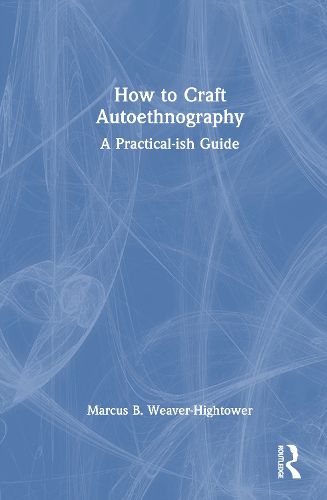Readings Newsletter
Become a Readings Member to make your shopping experience even easier.
Sign in or sign up for free!
You’re not far away from qualifying for FREE standard shipping within Australia
You’ve qualified for FREE standard shipping within Australia
The cart is loading…






How to Craft Autoethnography is a comprehensive and engaging guide to the art and science of autoethnography, a qualitative research method that blends personal narrative with cultural analysis. Designed to be both practical and theoretically grounded, the book offers a structured yet flexible approach to developing "good" autoethnographic research. Throughout the book, Weaver-Hightower addresses the essential components of autoethnographic research, including when to use (or not use) the method, how to generate and analyze data, and how to assess quality and ethics in an autoethnography. The book carefully explores different forms of autoethnography-evocative, analytic, critical, and arts-based-providing readers with concrete examples and exemplars. Practical chapters detail strategies for planning studies, generating data through self-reflection and memory work, engaging with social theory, and writing in ways that resonate with readers both inside and outside academia. This book provides an indispensable resource for students, scholars, and practitioners seeking to deepen their understanding of autoethnography and to use it effectively in their research. The book also includes a range of pedagogical features, such as learning objectives, exercises, and exemplars, to support readers in developing their own autoethnographic projects.
$9.00 standard shipping within Australia
FREE standard shipping within Australia for orders over $100.00
Express & International shipping calculated at checkout
Stock availability can be subject to change without notice. We recommend calling the shop or contacting our online team to check availability of low stock items. Please see our Shopping Online page for more details.
How to Craft Autoethnography is a comprehensive and engaging guide to the art and science of autoethnography, a qualitative research method that blends personal narrative with cultural analysis. Designed to be both practical and theoretically grounded, the book offers a structured yet flexible approach to developing "good" autoethnographic research. Throughout the book, Weaver-Hightower addresses the essential components of autoethnographic research, including when to use (or not use) the method, how to generate and analyze data, and how to assess quality and ethics in an autoethnography. The book carefully explores different forms of autoethnography-evocative, analytic, critical, and arts-based-providing readers with concrete examples and exemplars. Practical chapters detail strategies for planning studies, generating data through self-reflection and memory work, engaging with social theory, and writing in ways that resonate with readers both inside and outside academia. This book provides an indispensable resource for students, scholars, and practitioners seeking to deepen their understanding of autoethnography and to use it effectively in their research. The book also includes a range of pedagogical features, such as learning objectives, exercises, and exemplars, to support readers in developing their own autoethnographic projects.